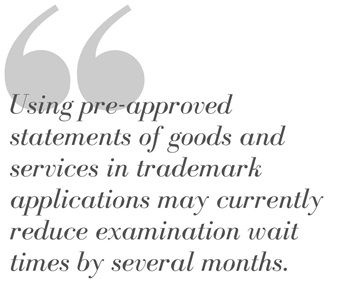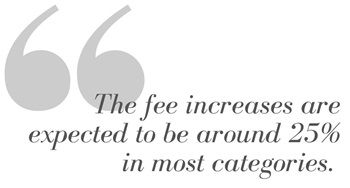The Canadian Trademarks Office (TMO) has taken several steps to reduce the backlog of trademark applications awaiting examination that now exceeds 39 months for national applications.
The measures include the following:
- Fast-tracking applications that use statements of goods and services that are pre-approved by the TMO;
- Accelerating examination upon request of applicants in certain limited circumstances, with a focus on counterfeit goods and online enforcement;
- Hiring and training of additional trademark examiners;
- Reducing the availability of extensions of time in examination; and
- Decreasing the number of times arguments can be submitted against a given objection raised in examination.
 Using pre-approved
statements of goods and services in trademark applications may
currently reduce examination wait times by several months. The
Goods and Services Manual (GSM) has been expanded to include over
100,000 entries.
Using pre-approved
statements of goods and services in trademark applications may
currently reduce examination wait times by several months. The
Goods and Services Manual (GSM) has been expanded to include over
100,000 entries.
The TMO has recently launched a new automated review of all unexamined applications in Canada, resulting in "pre-assessment letters" being issued to applicants or their agents.
The review will identify if amendments to the statement of goods and services is potentially required, as well as flag any missing or improper Nice Classification information, or both. A pre-assessment letter will issue permitting an applicant to:
- File an amendment to its application to adopt a pre-approved statement of goods and services in replacement of the statement at issue or delete the goods and/or services at issue; and/or
- Address any misclassification issues.
Responding to the pre-assessment is voluntary; no formal deadline is set by which an applicant must respond to a pre-assessment letter.
If a pre-assessment does not uncover any potential flaws, the applicant will receive notification that the application will be examined at an accelerated rate similar to that of applications containing pre-approved statements of goods and services.
Rising Fees
The Canadian Intellectual Property Office (CIPO) has also started a new consultation on fee increases for patents, trademarks, industrial designs, integrated circuit topographies, and copyrights. CIPO plans to publish these changes within the next year formally and for them to take effect by January 1, 2024.
The fee increases are expected to be around 25% in most
categories. 
For example, government fees for filing trademarks will be going up almost 29% compared to current rates, as will fees to file Statements of Opposition and requests for trademark cancellation proceedings. Similarly, government fees for a patent application by a regular applicant will be going up 25%. The fee increase is concerning to patent practitioners as CIPO's statistics show that the number of applications has been decreasing since 2018.
The Toronto IP team is actively contributing to this consultation and will be working with national organizations to provide relevant commentary. Given the changes, we encourage reviewing IP portfolios in Canada to take advantage of the current lower fees before these changes take effect.
The content of this article is intended to provide a general guide to the subject matter. Specialist advice should be sought about your specific circumstances.

